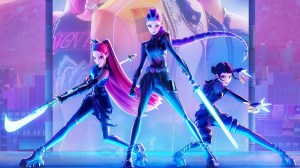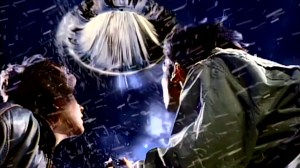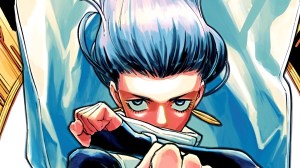While Black Panther might be a standalone film within the Marvel Cinematic Universe, the movie still manages to expand the world within the MCU by taking audiences not just to Wakanda, but into the fictional nation’s rich history, incorporating comic book history in the process.
Videos by ComicBook.com
WARNING: Major spoilers ahead for Marvel’s Black Panther. Continue reading beyond this point at your own risk.
Wakanda may be an isolated nation determined to keep themselves and their resources protected and safe by hiding from and shutting out the whole world, but as we find out in Black Panther, that doesn’t mean that Wakandans aren’t out in the world at large. In the film we are introduced to the War Dogs, a group of Wakandan spies who are scattered around the globe that function in a fashion similar to the CIA. During a visit to the Black Panther set last year, Lupita Nyong’o, who plays Nakia in the film, hinted at the group, described her character as a War Dog.
“I can say that Nakia, when we meet her, is a War Dog, which means she’s one of Wakanda’s CIA members,” Nyong’o said. “Her job is to spy around the world and report back to keep Wakanda safe and keep Wakanda informed.”
Now that Black Panther is in theaters we know a bit more about the War Dogs — Killmonger’s (Michael B. Jordan) father, N’Jobu (Sterling K. Brown) was one of them and his service and what he experienced as a War Dog “stationed” in Oakland, California is what sets in motion the plot of Black Panther — but the group doesn’t just push the story in the movie. They introduce a deeper element of the comics to the MCU. In comics, the War Dogs are a creation of writer Christopher Priest‘s run on Black Panther. First appearing in Black Panther Vol. 3 #4 in 1999, Priest introduced the Hatut Zeraze, Wakanda’s secret police made up of elite spies and assassins recruited from all across Wakanda. The name Hatut Zeraze translates to “the dogs of war.”
In the comics, the Hatut Zeraze are formed by T’Challa’s father, King T’Chaka, and wear a uniform that resembles an all-white version of the Black Panther armor. As the Dora Milaje serve as personal bodyguards of the Black Panther and king, the Hatut Zeraze in comics served Wakanda as a sort of black ops group. When T’Challa becomes king, however, he disbands the group, not wanting a group of assassins as part of his government. In the comics partially leads to the creation of one of Black Panther’s key adversaries, the White Wolf (you can read more about the White Wolf here).
While N’Jobu’s experience as a War Dog leads him to betray Wakanda by stealing vibranium with the intention to use it to start a revolution — an act that leads to his death and sends Killmonger on the life-long quest for vengeance we see in Black Panther — the War Dogs don’t play a major role in the film. However, that doesn’t mean that they won’t factor in Black Panther sequels. When Killmonger briefly takes the throne, he reaches out to the War Dogs scattered around the world and it’s mentioned that while some are reluctant to use Wakandan weapons to start a Wakandan revolution globally, a handful were eager to pick up arms. Add to that the post-credits scene that reveals Bucky Barnes being called “White Wolf” by a group of children, and viewers may well have just been given a hint and the conflict ahead in the next phase of the MCU.
Black Panther is now in theaters. It will be followed by Avengers: Infinity War on May 4th, Ant-Man and the Wasp on July 6th, Captain Marvel on March 8, 2019, the fourth Avengers movie on May 3, 2019, the sequel to Spider-Man: Homecoming on July 5, 2019, and Guardians of the Galaxy Vol. 3 in 2020.








